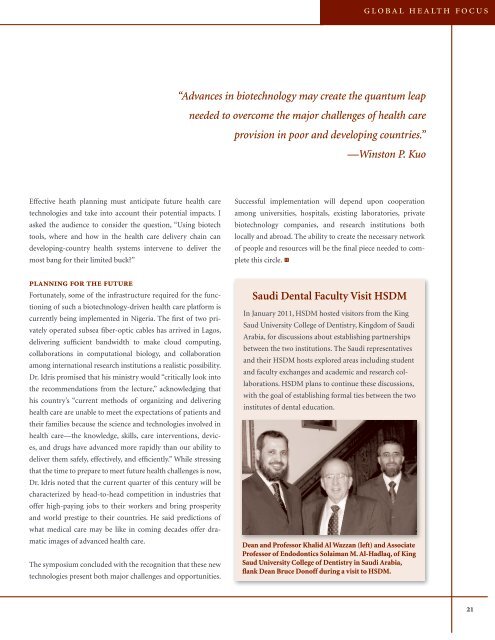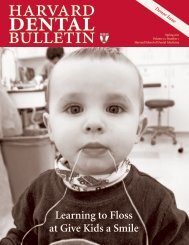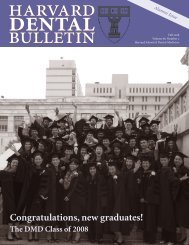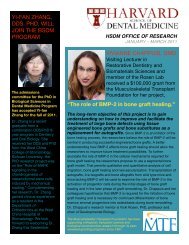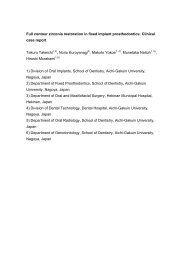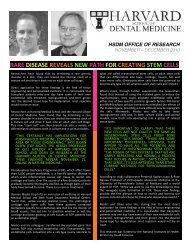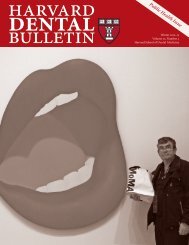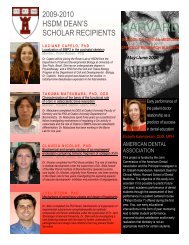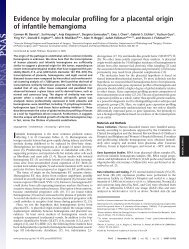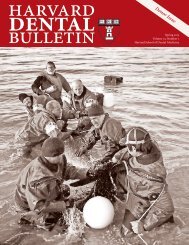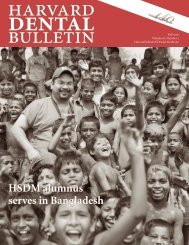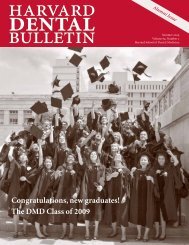Research Issue - Harvard School of Dental Medicine
Research Issue - Harvard School of Dental Medicine
Research Issue - Harvard School of Dental Medicine
You also want an ePaper? Increase the reach of your titles
YUMPU automatically turns print PDFs into web optimized ePapers that Google loves.
global health fo cus“Advances in biotechnology may create the quantum leapneeded to overcome the major challenges <strong>of</strong> health careprovision in poor and developing countries.”—Winston P. KuoEffective heath planning must anticipate future health caretechnologies and take into account their potential impacts. Iasked the audience to consider the question, “Using biotechtools, where and how in the health care delivery chain candeveloping-country health systems intervene to deliver themost bang for their limited buck?”Successful implementation will depend upon cooperationamong universities, hospitals, existing laboratories, privatebiotechnology companies, and research institutions bothlocally and abroad. The ability to create the necessary network<strong>of</strong> people and resources will be the final piece needed to completethis circle.Hplanning for the futureFortunately, some <strong>of</strong> the infrastructure required for the functioning<strong>of</strong> such a biotechnology-driven health care platform iscurrently being implemented in Nigeria. The first <strong>of</strong> two privatelyoperated subsea fiber-optic cables has arrived in Lagos,delivering sufficient bandwidth to make cloud computing,collaborations in computational biology, and collaborationamong international research institutions a realistic possibility.Dr. Idris promised that his ministry would “critically look intothe recommendations from the lecture,” acknowledging thathis country’s “current methods <strong>of</strong> organizing and deliveringhealth care are unable to meet the expectations <strong>of</strong> patients andtheir families because the science and technologies involved inhealth care—the knowledge, skills, care interventions, devices,and drugs have advanced more rapidly than our ability todeliver them safely, effectively, and efficiently.” While stressingthat the time to prepare to meet future health challenges is now,Dr. Idris noted that the current quarter <strong>of</strong> this century will becharacterized by head-to-head competition in industries that<strong>of</strong>fer high-paying jobs to their workers and bring prosperityand world prestige to their countries. He said predictions <strong>of</strong>what medical care may be like in coming decades <strong>of</strong>fer dramaticimages <strong>of</strong> advanced health care.The symposium concluded with the recognition that these newtechnologies present both major challenges and opportunities.Saudi <strong>Dental</strong> Faculty Visit HSDMIn January 2011, HSDM hosted visitors from the KingSaud University College <strong>of</strong> Dentistry, Kingdom <strong>of</strong> SaudiArabia, for discussions about establishing partnershipsbetween the two institutions. The Saudi representativesand their HSDM hosts explored areas including studentand faculty exchanges and academic and research collaborations.HSDM plans to continue these discussions,with the goal <strong>of</strong> establishing formal ties between the twoinstitutes <strong>of</strong> dental education.Dean and Pr<strong>of</strong>essor Khalid Al Wazzan (left) and AssociatePr<strong>of</strong>essor <strong>of</strong> Endodontics Solaiman M. Al-Hadlaq, <strong>of</strong> KingSaud University College <strong>of</strong> Dentistry in Saudi Arabia,flank Dean Bruce Don<strong>of</strong>f during a visit to HSDM.21


